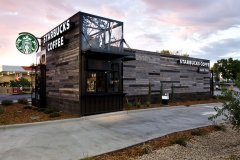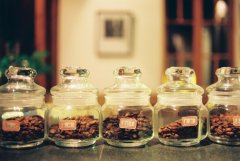Seoul, which is the best at "imagining Paris": making it as easy to go to a coffee shop as it is to go to a supermarket!

For professional baristas, please follow the coffee workshop (Wechat official account cafe_style)
Paris, France, described by Xu Zhimo, is a Paris where you can always find a cafe in the streets; it is a Paris with endless coffee cups at night. Imagine Paris, it seems that as long as walking in the street, you can always smell the strong smell of coffee in the air. This kind of imagination does not exist only in Xu Zhimo's works. Among the contemporary East Asian cities, there is no better way to "imagine Paris" than Seoul. Taiwan's 7-ELEVEN advertising slogan "the whole city is my coffee shop" is used to describe convenience stores that go deep into every corner of Taiwan, just like cafes offering freshly made coffee. The same slogan might be more appropriate in Seoul, and it can even be further said that Seoul's coffee culture may have gone beyond "imagined Paris".
How does Seoul imagine Paris and French culture? From the perspective of urban landscape and urban culture, it is an easy reference point to enter. Walking on the streets of Seoul, you can easily find several cafes in every block. The density of cafes is very high. Living in Seoul, going to cafes is almost as easy and frequent as Taiwanese going to convenience stores. And these cafes stand in the city with strong Western modernity, and a large number of cafes even use the name "French" to try to connect with the French image. There are also a large number of bakeries and restaurants, combined with other symbolic images, such as the French flag, color matching (blue, white, red), the Eiffel Tower and other specific images on the landscape. Among them, the most extreme example is the small French village on the outskirts of Seoul, which is based on the French fairy tale novel "the Little Prince". However, whether it is a cafe, a bakery or a small French village, Seoul's vision of Paris stays at the "cultural code" level, connecting Paris and France from coffee, architectural design and decoration.
6632596 South Korean bakery chain PARIS BAGUETTE (Photo / Wang Zewei)
In addition to the urban landscape, we can also observe how Seoul interacts with the "French" symbols in the landscape to further understand the urban culture of the city. The air in Seoul is not as romantic as Xu Zhimo's description of Paris with the aroma of coffee everywhere, which may just be the romance of literary works. However, there are probably no fewer types of "broad cafes" on the streets of Seoul than in Paris. Why does Seoul need so many cafes? What is the special significance of a space like a cafe and how to interact with the local people? How does Seoul's imaginary Paris, that is, exotic in the city, play a role in the city?
Coffee culture is rooted in Seoul, and drinking coffee is almost a part of most people's daily life. In addition to the cafes adjacent to the community, Korean bakeries and pastry shops often appear in the form of combined cafes, which provide seats for consumers to use in addition to selling coffee. From the coffee culture to the reappearance of the landscape, it is not difficult to find that Seoul advocates French culture and western modernity and high-quality life.
"Coffee space" is not only a leisure space for Koreans to enjoy refreshments, but also, in a deeper sense, the social function of cafes in the neighborhood. In Seoul's "Community cause [1]" project, cafes are community communication spaces for various activities such as community lectures and celebrations. This kind of community building project centered on community cafes finds a new outlet for the common interpersonal interaction in modern cities, and improves the relationship between urban residents.
In fact, there are great differences in coffee culture between Taiwan and South Korea. In Taiwan, convenience store coffee is "common people's coffee" and "take-out coffee". Cafes are relatively expensive, and their space can be a functional space for friends' gatherings and a work / leisure space for freelancers. Generally speaking, "going to the cafe" is a relatively high consumption behavior, not a part of the life of ordinary people, but excluding the consumption space of specific social classes. The cafe does not have the function of rallying community consciousness as it does in Seoul.
When the coffee space enters the life and culture of ordinary people, it also affects the Korean catering industry. In addition to the aforementioned bakeries (such as Paris Baguette and Tous Les Jours), Korean dessert shops (similar to Taiwan's ice shops) have also become alternative coffee spaces, selling ice products also need to provide space for consumers to sit for a long time, and most of these spaces are also provided with electrical outlets like cafes [2]. Also because of the importance of this kind of space to Koreans, Taiwanese hand-shaking cup makers gong-cha and share tea also changed their "take-away style" characteristics in Taiwan when they entered Korea, and the storefronts experimentally imitated the coffee space to provide seats for internal use, forming an interesting phenomenon of Taiwan-Korean-French cultural mix (hybridity).
There are many mutual references in the development process of Taiwan and South Korea. with the rapid economic growth of Asian countries, in recent years, both Taiwan and South Korea have developed a phenomenon of labor-intensive industrial transfer, which is different from the labor-intensive industrial transfer driven by the pressure of production costs and labor costs in the 1980s and 1990s. the tertiary industries of contemporary Taiwan and South Korea have taken the initiative to transfer industries to other countries (especially catering) because of the improvement of consumption power of other countries. This is different from the industrial transfer (Industrial Transfer) in the previous era, which was "deculturalization", focusing only on industrial structure, labor quality and cost.
However, just like the example of the transfer of Taiwan's hand cup to South Korea, there is a deeper process of cultural transfer (cultural transfer) behind the contemporary industrial transfer, in which we need to face the cultural context of the home country and other countries before / after the industry transfer, and then what cultural characteristics can be transferred? How does the transfer process culture transform / need to be transformed? And complex issues such as how to play a role in local culture after the transfer may be an important key to the economic development of Taiwan and South Korea, which is worthy of our further consideration.
Notes
Seoul's "community enterprise" can be understood as a "community building plan" similar to Taiwan's. "Community undertaking" is a resident-led cause, in which residents personally implement and promote all the processes of community undertakings, such as proposals, plans, and ex post management. Provide education, counseling, consultation and other comprehensive support to assist residents to find the current problems and projects of common concern in the community, and to provide comprehensive support for all activities that enable the community to take shape.
In modern cafes, an important condition for being able to "wait for a long time" is the Internet and power supply, because modern consumers consume electricity to use laptops and mobile phones anytime and anywhere, in addition to reading in coffee space.
(this article is reproduced under the authorization of "GEOGDAILY"; original source: Paris imagined by Seoul: talking about the cross-border culture of coffee space and Taiwan's hand cups; the first picture and title are added by the editor: * 0* PrincessCCCC,CC Licensed)
Important Notice :
前街咖啡 FrontStreet Coffee has moved to new addredd:
FrontStreet Coffee Address: 315,Donghua East Road,GuangZhou
Tel:020 38364473
- Prev

Starbucks' first mobile truck coffee shop launched
For professional baristas, please follow the coffee workshop (Wechat official account cafe_style). Starbucks Starbucks has opened a small new store in Colorado, but the store does not have leather chairs, free recharging power, or even a place for customers to sit down. It turned out to be Starbucks's first mobile mini-coffee shop, and the small storefront
- Next

It's just that there is a cost for a substitute mill? Four risks of baristas helping you grind beans
Professional baristas Please follow the Coffee Workshop (official Wechat account cafe_style) A recent post on Facebook has aroused heated discussion and echoes among many people in the barista community. The main idea of the post is that there is a barista who owns a storefront of his own. After a long period of operation, he often encounters regular customers who bring beans from others or beans bought in the store to ask for exemption.
Related
- The ceremony is full! Starbucks starts to cut the ribbon at a complimentary coffee station?!
- A whole Michelin meal?! Lucky launches the new "Small Butter Apple Crispy Latte"
- Three tips for adjusting espresso on rainy days! Quickly find the right water temperature, powder, and grinding ratio for espresso!
- How much hot water does it take to brew hanging ear coffee? How does it taste best? Can hot water from the water dispenser be used to make ear drip coffee?
- What grade does Jamaica Blue Mountain No. 1 coffee belong to and how to drink it better? What is the highest grade of Blue Mountain coffee for coffee aristocrats?
- What are the flavor characteristics of the world-famous coffee Blue Mountain No. 1 Golden Mantelin? What are the characteristics of deep-roasted bitter coffee?
- Can I make coffee a second time in an Italian hand-brewed mocha pot? Why can't coffee be brewed several times like tea leaves?
- Hand-brewed coffee flows with a knife and a tornado. How to brew it? What is the proportion of grinding water and water temperature divided into?
- What is the difference between Indonesian Sumatra Mantinin coffee and gold Mantinin? How to distinguish between real and fake golden Mantelin coffee?
- What does bypass mean in coffee? Why can hand-brewed coffee and water make it better?

